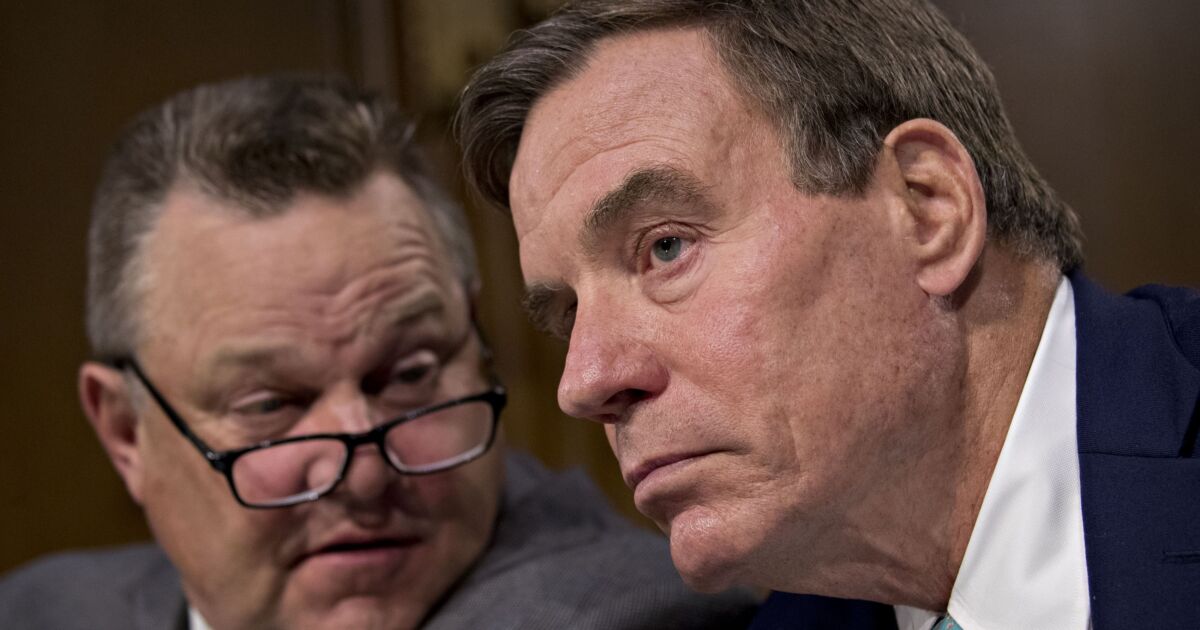
WASHINGTON — Senate Moderates and even some Democrats raised fresh concerns Tuesday about the potential that new bank regulations could have unintended consequences like restricting minorities' and small businesses' access to bank provided capital.
Senate Banking Committee members like Sen. Jon Tester, D-Mont., pressed the regulators — including Federal Reserve Vice Chair for Supervision Michael Barr, Federal Deposit Insurance Corp. Chair Martin Gruenberg, National Credit Union Administration Chair Todd Harper and acting Comptroller of Currency Michael Hsu about the potential impact of coming proposals. Tester said that despite the fact that the rules apply only to banks with at least $100 billion in assets — roughly 1% of all banks in the nation — he wanted to make sure the rules don't disincentivize banks' lending in ways that could hurt the broader economy.
"These rules don't affect any banks in Montana, but they do affect the big guys that affect Montana," he noted. "From a small-business standpoint, if this rule doesn't work, it's gonna raise hell with the economy of my state."
Bank regulators last testified in May of this year, as the fallout from three bank failures was still fresh. But in Tuesday's appearance on Capitol Hill — their first since proposing the Basel III endgame rule — members from both parties in the Democrat-led Senate were calling for revisions to the rule.
Federal Reserve Vice Chair for Supervision Michael Barr indicated regulators are poised to consider changes to the rule given bipartisan uneasiness, noting throughout the hearing he welcomed comments and critiques that inform any edits regulators make.
"The proposal makes our capital system more consistent, more transparent and more sensitive," Barr said. "That said, we recognize that the rule may not appropriately capture all risks, we welcome all comments on all aspects of the rule and will take these comments seriously to improve the rule going forward."
Other moderates, like Sen. Bob Menendez, D-N.J., cited a recent study by the Urban Institute that suggested higher capital requirements could discourage banks from continuing to originate higher loan-to-value mortgages — loans that are key to helping minorities become first-time homeowners.
"What do you say to Black and Hispanic communities who are concerned that your proposal could make the dream of homeownership even more difficult to achieve?" he asked regulators. "I appreciate your desire to maintain the safety and soundness of the financial system [and] I would encourage you to also ensure that we keep enough capital flowing so hardworking borrowers can become homeowners."
Another moderate, Sen. Mark Warner, D-Va., also nodded to the study in his urging regulators to balance systemic risks with maintaining credit access. He said that bank industry voices have long told him new regulations that mandate an increase to big banks' capital cushions — and reduce the amount of money banks can leverage to earn profits — will incentivize firms to retract lending.
"This may actually be the time when — as we've seen from some of the civil rights organizations — [there are] real concerns about that lack of lending in the mortgage field," Warner said.
Warner added that rather than issuing a complex rule, regulators might consider using their existing authority to reduce risks to the banking system. Warner floated the idea that regulators might require banks to regularly utilize the Federal Reserve's discount window to keep liquidity risks in check.
"I don't have any sympathy for banks who then say, 'Well, that would put us under the stigma from the market," Warner said. "You can't complain about regulations and then not use the tools that are already existing."
The regulators indicated they are open to considering mandating that banks regularly utilize the Fed discount window to relieve liquidity stress.
"We are looking at the kinds of issues you raised with respect to making sure that banks are prepared to use the discount window, they have good contingency funding plans, they test those plans and they use the discount window," Barr said. "I think you raise an excellent point."
Gruenberg agreed, saying regulators might take a look at requiring banks to periodically tap the Fed discount window to relieve liquidity stress to the system.
Warner also indicated regulators should consider extending the comment period so parties with political stakes in weighing in on the proposal can thoroughly review and comment on the rule.
Regulators already extended the comment period for the large bank capital proposal. Barr said he was "happy to consider" extending the comment period on two other recent proposals: one imposing a new long-term debt requirement for big banks and another revamping the resolution planning requirements for the largest banks.
At the same time, more liberal Democrats like Massachusetts Sen. Elizabeth Warren doubled down on the capital hikes. She noted that higher capital standards will make banks safer, and she attributed the industry backlash to the fact that new capital requirements could make it harder for CEOs to reap maximum profits. She noted that — as regulators have stated — the rules will only affect just under 40 of the nation's largest firms, leaving the capital rules for 99% of U.S. banks unchanged.
"The Fed is focused with surgical precision on raising capital standards for the 1% of banks that pose the biggest risk to the economy, and on the specific banking activities that pose substantial risks," she noted. "I understand that the lobbyists for that 1% of banks don't like it, but we don't work for them. The proposed rule is now 15 years overdue and I urge you to finalize it and put strong capital requirements in place as soon as possible."
Republicans continued to level critiques about the coming capital hikes. Notably, 39 senators — including every GOP Senate Banking Committee member — signed a letter originated by Sen. Tim Scott, R-S.C., urging regulators to withdraw the proposed Basel endgame rule.
"I think you need to go back to the drawing board," said Sen. Bill Hagerty, R-Tenn.



